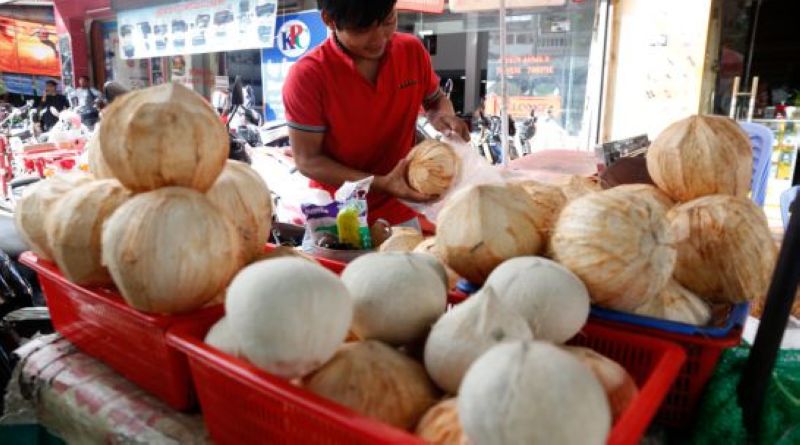Cambodia: Patience a virtue for coconuts
The Kingdom’s nascent coconut oil industry is facing a shortage of raw materials as local farmers look to make a quick profit by selling young coconuts to drink vendors rather than letting them mature and sell them to health care and cosmetics producers.
Khdib Sreymich, general manager of Coco Khmer, a Cambodia-based coconut cosmetics manufacturer, said her company is forced to import coconuts from Vietnamese suppliers to meet consumer demand for the company’s products. She explained that the farmers preferred to sell the coconuts when they were young, though mature fruits, which can be sold for higher prices, are needed for coconut oil production.
According to Sreymich, domestic production can only satisfy 10 percent of the company’s demand for mature coconuts. The remaining 90 percent must be imported from Vietnam.
“Our priority is to try to promote domestic coconut production because they are of high quality and grown organically,” she said. “But we are faced with a shortage of domestic supply because of the popularity of young coconuts for consumption, which is a challenge for us.”
Coco Khmer uses coconut oil extracted from mature coconuts to make a variety of products, including aftershave, various skin balms and body scrubs that are then sold in Cambodia and internationally.
While young coconuts, which can be harvested after three months, can be used for coconut water, mature coconuts require six months before harvesting but can fetch almost triple the price.
“We are trying to educate farmers to help them understand the benefits of growing mature coconuts to add value to the agricultural production chain,” she said.
Chhay Vuthy, a member of the Oil of Joy coconut oil producing cooperative, one of Coco Khmer’s suppliers, said that to maintain oil production and satisfy the cosmetics producer’s demand his cooperative needed to collect 150 to 170 dozen mature coconuts a week. However, he said the cooperative could only collect 30 to 50 dozen domestically.
“Domestic farmers sell young coconuts because they face financial difficulties or they have insufficient knowledge of the value of mature coconuts,” he said. “Young coconuts cost around 12,000 riel ($3) per dozen while mature coconuts can reach up to 30,000 riel ($7.5).”
He added that currently, the Oil of Joy facility can produce 1,600 litres of coconut oil per month, which it sells to Coco Khmer for $9 or $10 per litre.
Grahame Dixie, executive director of Grow Asia, said global consumption of coconut is on the rise and is providing an opportunity to support Cambodian farmers and their cultivation of the tropical drupe. However, he said farmers should allow coconuts to mature in order to realise higher profits and support value-added products.
“Many smallholders are harvesting too early to realise profits sooner at the expense of waiting to sell at a higher price,” he said, adding that coconuts are a priority crop for the Cambodia Partnership for Sustainable Agriculture, an initiative that Grow Asia helped establish in 2015.
“A working group dedicated to strengthening the coconut value chain is focusing on farmer training, better processing methods and market links, aiming to help Cambodia’s smallholders improve their yields, productivity and sustainability,” he said.
According to Ministry of Agriculture figures for 2016, coconut is cultivated on a total of 16,935 hectares in Cambodia, mainly in Preah Sihanouk, Kampong Speu and Kampot provinces.









